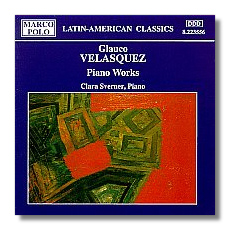
The Internet's Premier Classical Music Source
Related Links
- Latest Reviews
- More Reviews
-
By Composer
-
Collections
DVD & Blu-ray
Books
Concert Reviews
Articles/Interviews
Software
Audio
Search Amazon
Recommended Links
Site News
 CD Review
CD Review
Glauco Velasquez

Piano Works
- Valsa romântica
- Brutto sogno
- Rêverie
- Valsa lenta
- Prelúdio e Scherzo
- Prelúdios #1 and 2
- Divertimento #2
- Folhas d'album #1 and 2
- Menuetto e Gavotte Moderni
- Danse des Silphes
- Canzone Strana
- Impromptu
- Melancolia
- Devaneio
Clara Sverner, piano
Marco Polo 8.223556 DDD 65:12
Produced by Eckhard Steiger
Yet another Marco Polo release that sends you reaching for your dictionaries. Glauco Velasquez? Well, he wasn't in Baker's so I am obliged to J. Jota de Moraes' essay with this CD. Velasquez was the son of the Portuguese baritone Eduardo Medina Ribas and the unmarried Adelina Alambary Luz, who hid herself in Naples to give birth to the future composer - in 1884 - without attracting social opprobrium. In 1896 she moved with the young Glauco to Brazil, where from 1898 his obvious talent gained the attention of his better-known teachers, Frederico Nascimento and Francisco Braga. His first public appearance as a composer was in 1911, and four years later he was dead, a victim of tuberculosis; the surviving works date from 1903 onwards. His nonetheless respectable output - there are some hundred pieces, most fairly short - will come as news to most folk, me included. The peak of his catalogue, say those who know, takes the form of four piano trios which with luck will also be attracting Marco Polo's attention before too long.
What we have here appears to be the complete piano music, though the claim is made explicitly only in an aside by the pianist on this disc, Clara Sverner. Most turn in at just a few minutes in length; the most ambitious, a Prelúdio e Scherzo, is nine-and-a-half minutes long. The titles give away the character of most of these pieces: you have two Prelúdios, two Album-leaves, a Divertimento #2 (but no #1 - so these aren't the complete piano pieces?), a Valsa lenta, a Rêverie, a Petite Suite (is this the Suite #1 referred to in the notes?) consisting of a Gavotte, a Minuetto and a Valsa mignone - you'll get the picture.
But what you won't get from this bald list is an idea of the range of Velasquez's style, or styles. You have here a composer in the making, with the tragic proviso that you don't hear him made. Velasquez begins by writing à la Scarlatti and Bach, sometimes displaying a degree of rhythmic independence that could be mere miscalculation by the prentice composer but is more likely to be his emerging sense of adventure; the Prelúdio e Scherzo, for example, has the shadow of a Bach Prélude and fugue not too far behind it, though a Bach translocated far from Leipzig. And as Velasquez's wings strengthen, he looks farther afield via Chopin (perhaps the strongest element overall) to Debussy to Scriabin, to the extent that by the time of his death he was on the way to becoming a very promising composer indeed. (Since the CD presents the music in anything but chronological order, this intellectual development is obscured, which is rather a shame.) One constant in his stylistic evolution is a horror vacui: he can't leave alone, and the gaps between the main notes of a melody in the treble will be filled with shorter note-values in the middle of the texture or in the bass. As a result, even in the simplest pieces, the music is never at rest.
The performances by Clara Sverner (she's Brazilian, too) are sympathetic, if more alive to the softer, more romantic side of the music than its admittedly meagre opportunities for rhythmic life. The piano tone is adequate, though a little more depth would have been welcome. One annoying touch is that the piano mechanism is audible, particularly at the beginning of the disc (either that or I got used to it). A fascinating and slightly saddening disc, then, full of promissory notes.
Copyright © 1996/1998, Martin Anderson


















